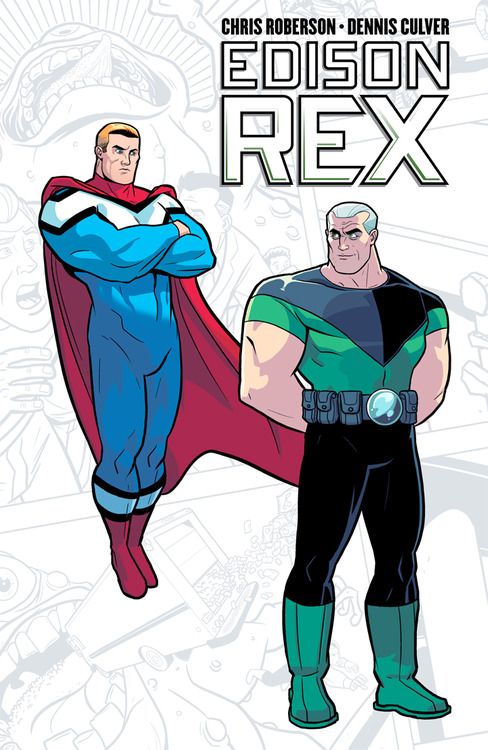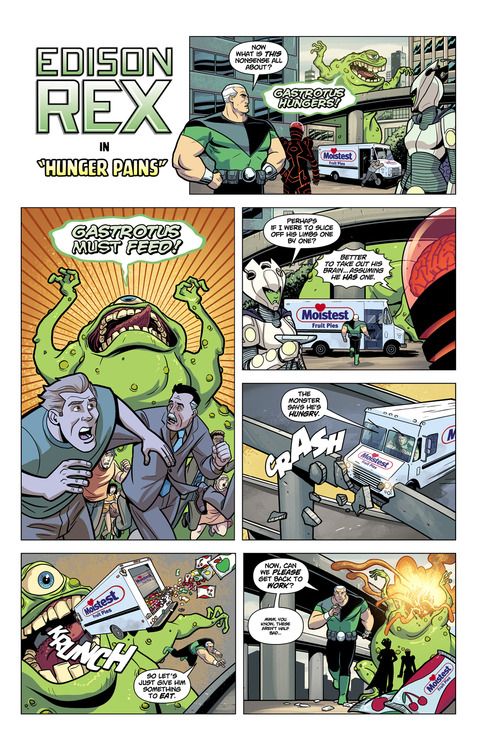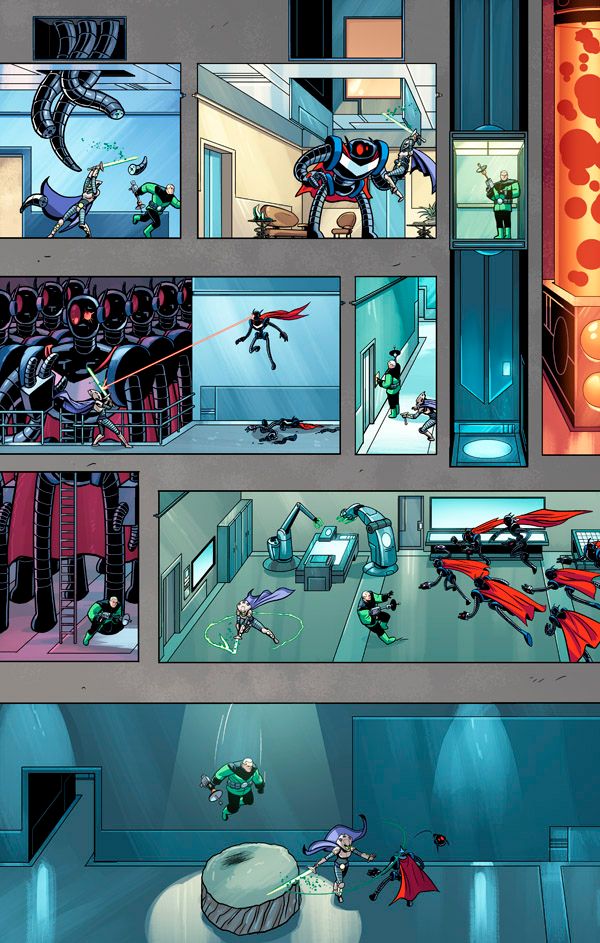Last week was a banner one for Monkeybrain Comics, as plans were revealed to "bring its digital titles to print beginning in June in collected editions released through IDW Publishing and Shadowline/Image." But before this deal was announced I caught up with Chris Roberson, the writer of Edison Rex and co-publisher of Monkeybrain.
This interview was conducted before the IDW and Shadowline/Image agreements were announced, which is why they're not discussed. Edison Rex #6 will be released March 13. Roberson is great to chat with about the creative process, as he relishes revealing how the narrative hot dogs are made almost as much as creating the stories themselves. The world that Roberson and co-creator/artist Dennis Culver had built for the series fascinates me, and it was a pleasure to chat with the writer about it.
Tim O’Shea: As much as this series is about a villain becoming a hero, there's a great undercurrent of humor. Is that the core appeal of the series from a creative standpoint?
Chris Roberson: I always like a little levity in the stories I read or the shows I watch. When stories maintain a consistently grim tone, it can be a little wearying. Adding in a joke here and there not only serves to lighten the mood from time to time, but also makes the more serious moments stand out by contrast.
Has the concept evolved or been tweaked from your original idea, based on how the audience has responded to certain elements?
The series and the characters are constantly evolving, but due more to new ideas that Dennis and I have than to anything we’ve heard back from readers. We’re just having a blast exploring these characters and the world they inhabit, and are continually coming up with new things we want to add in!
While you went into Edison Rex expecting the immediate gratification (getting the story in the audience's hands) that the digital release platform fosters, what are the other major benefits gained from going digital?
Probably one of the principle benefits of the digital format is the flexibility we have. If Dennis decides that a sequence needs more space to breathe, he can expand on what’s in the script to add extra panels, or extra pages, whichever works best. And the addition of the “REXfiles” and other backup features came about largely because we realized that there was no reason not to put them in. In a print comic, we’d have to weigh the relative benefits of using those pages, but in digital we can just add an extra page to the file without impacting the costs at all.
How did you all go about selecting Steve Downer and John J. Hill for the creative team?
I was lucky enough to work with Downer on Elric: The Balance Lost for BOOM! Studios, and knew he was the colorist we wanted. And John J. Hill lettered all of my Superman issues for DC Comics, and I knew he’d do a fantastic job. And both of them have proved me right!
When and why did you decide to do "Hunger Pains" the great 1970s Hostess ad homage (in Edison Rex #4)?
Doing a nod to the “fruit pie” one-page ads was something that we’d discussed fairly early on, and we got it into the book as quickly as we could. As for why? Why NOT? I have VERY fond memories of those ads, and wanted to see if it might be possible to do one that was “in continuity,” as it were. And Dennis and Steve went to TOWN on the art for it!
While the secret files of Edison Rex are clearly influenced by the Official Handbook of the Marvel Universe, it is different in one major way--it is written in the voice of Rex. When did you realize you wanted that as part of the comic monthly package?
Again, that was something that we had talked about doing almost since the very beginning. On a practical level, it was a handy way of working in a lot of character detail and backstory in a very small amount of space. And on a purely personal note, I was obsessed with things like the Official Handbook of the Marvel Universe and Who’s Who in the DC Universe when I was a kid, and had always wanted to do something like that myself. The decision to make it Rex’s voice in the text, though, was one that took a little time to develop, but once we realized that we can actually make the “handbook” pages part of the narrative that way, there was no looking back.
What are Dennis storyteller's strengths?
Besides just drawing amazing looking figures and incredibly detailed environments, I love the gestures and facial expressions in Dennis’s work. He’s able to communicate SO much with just the turn of a lip or the raising of an eyebrow. But I’ve been really struck over the course of the first six issue on just how much Dennis has developed in such a short time. I loved his work when I first saw it a few years ago, and thought that the first issue of Edison Rex couldn’t have looked better. But every few issues I send Dennis emails filled with gushing praise, insisting that he’s leveled up again. Each new issue looks better than the last, and there’s no hyperbole in that.
Could you talk to me a little bit about Edison Rex’s character development?
Edison Rex was the first character to be conceived. I first came up with the name and the basics of his story a few years ago. I had been reading a lot of pulp novels and Bronze Age superhero comics (as I often do), and realized that the “mad scientists” that so many superheroes fought were only one note removed from the “science heroes” of the pulps, and that it might be interesting to take a “criminal genius” and reverse engineer him back into a hero. I tried a few times to get it together, and even talked with some other artists about the possibility of working on it with me, but I couldn’t figure out the correct tone, and ended up shelving it. Then, last year at Emerald City Comic Con, Dennis and I started talked about wanting to work together on a project, and as I usually do when first collaborating with someone, I asked him what kinds of things he wanted to draw. He gave me one of those “THIS meets THAT” kind of elevator pitches, and I realized that what he was describing was almost exactly the kind of thing I’d been wanting to do with Edison Rex. So I sent him over the notes I had on it, and almost immediately he started sending me drawings that captured the tone I was trying to hit exactly. It was fate!
Creatively, which one of you got the most creative satisfaction out of this page?
Both of us? That page represents not only a fantastic artist working at the height of his abilities, but an example of pure collaboration. I love cutaways and maps and diagrams, and had the basic idea for that page. I think I apologized a lot to Dennis when I described it to him, since I knew it was going to be a lot of work. But he took the ball and ran with it. And it remains one of my single favorite pages in the series to date!
I was struck that The Nuclear Norseman (in issue 2), without his powers, is someone suffering from Amyotrophic lateral sclerosis (ALS). I was struck at how Rex, once he defeated Norseman, said that the world was a "safer place with you back in that wheelchair". Did you struggle at writing a line like that? That line was on the heels of Rex explaining to Norseman "It wasn't the wheelchair that made you a loser, Sven. It was the person you were inside."
It wasn’t something I struggled with in particular, but actually grew out of a realization that I made years ago that really affected me. That is, that it infantilizes an individual with a handicap or other special needs if you refuse to regard them as you would any other adult. Simply because someone is in a wheelchair or lacks the use of their eyes or hearing, doesn’t mean they can’t be a jerk.
What are the long range plans for Edison Rex--is this an ongoing series, or do you see this as having a finite run of 20 issues or so?
I would be happy writing Edison Rex (and seeing it brought to brilliant life by Dennis’s art!) for the rest of my life if I can get away with it. We have a LOT of cool stuff planned.




